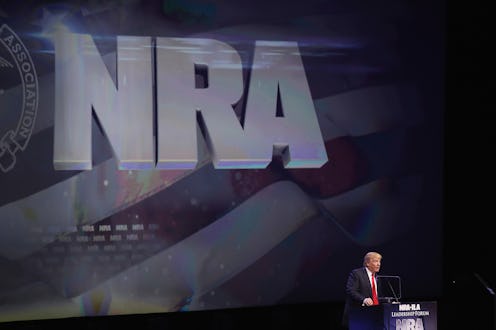News
The Long History Between Russia & The NRA

As the investigation into possible Russian collusion during the 2016 U.S. election continues, new reports have surfaced detailing potential ties between Russia and the National Rifle Association. The reports suggest that NRA member Paul Erickson sought to connect the Trump campaign with Russian president Vladimir Putin during the 2016 presidential campaign (Bustle has reached out to the NRA for comment).
A New York Times article details an email that was reportedly sent by Erickson, a conservative activist, to Trump campaign adviser Rick Dearborn. In the email — sent in May 2016, around the time of the NRA national convention — Erickson reportedly told Dearborn that the Russians were "quietly but actively seeking a dialogue with the U.S.," and said that Putin wanted to invite Trump to the Kremlin before the U.S. presidential election.
As The Washington Post reported in April, Russian activists have sought to forge connections with conservative Americans on issues such as gun control, terrorism, and religion since late 2015. In December of that year, a Russian gun rights group called Right to Bear Arms hosted a U.S. delegation from the NRA, which included David Keene, former national president of the organization, as well as Erickson himself.
While Russia's gun laws are stricter than the United States's, gun rights activists have nonetheless used the Second Amendment as a tool to connect with American conservatives. Nada Bakos, a former CIA analyst, noted on Twitter that it is unlikely Putin would ever loosen gun laws in the Russia, but the president could very well see an opportunity to "court American conservatives" with this issue.
The Times reported that Erickson's attempt to connect the Trump campaign and the Kremlin involved Alexander Torshin, a Russian banker with strong ties to Putin who has actively lobbied the Russian senate to allow concealed carry permits in his home country. Torshin reportedly worked not only through Erickson, but also through an American advocate of Christian causes, a man named Rick Clay, to try to set up a meeting between Putin and Trump. The meeting request that went through Clay was reportedly rejected by Jared Kushner.
The Times reports that for the moment, it is unclear how Dearbon responded to the reported request from Erickson; in addition, the NRA has not returned a request for comment from Bustle.
While the full significance of these email exchanges will not be certain until the Russia investigation is fully fleshed out, gun law reform advocate Shannon Watts questioned whether the NRA-Russia connection might suggest that the organization's funding comes from foreign sources.
Others noted that this isn't the first example of Russian efforts to influence American politics. As Max Bergmann, a Senior Fellow at the Center for American Progress, noted, they hearken back to Soviets' attempts to target American politics during the Cold War.
In an article for national security blog War On The Rocks that was published in June, Ian Johnson noted that Russian efforts to target the West date even further back than the Cold War. He cites examples such as Henry Wallace, FDR's second vice-president and later a Truman administration member, who reached out to the Soviet Union to seek help on a potential political nomination. As early as the 1930s, the Soviet Union leveraged contacts with international newspapers to pedal misleading information about the country.
While Russia's attempts to influence American politics and media are nothing new, the connection between the Kremlin and the NRA appears to be a relatively recent one. For now, it's just one piece of special counsel Robert Mueller's larger investigation into the latest piece of possible Russian collusion in with the United States.